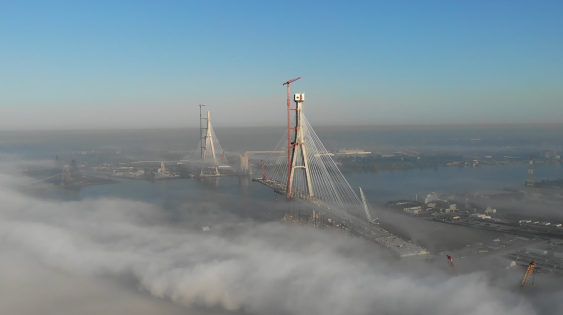 ATU 1555 President Jesse Hunt announcing strike. Photo: Matthew Roth
ATU 1555 President Jesse Hunt announcing strike. Photo: Matthew RothStanding in front of union headquarters in downtown Oakland this afternoon, leadership for BART's Amalgamated Transit Union (ATU) Local 1555 announced that their rank and file would walk off the job after the last trains finish their run this Sunday night, effectively shutting down BART across the Bay Area. ATU 1555 represents train operators and station agents and is the second largest union working for BART, representing roughly 900 employees.
ATU 1555 President Jesse Hunt said that after four months of negotiating, his members turned down a contract proposal and took the members concerns to BART's negotiating team, thinking the negotiations were fruitful, so he was upset and surprised by the unanimous vote by BART's Board of Directors to impose a one-year contract on them after an executive session this morning.
"The contract that the BART Board has decided to impose is far worse
than the contract that was in front of our members this week. It's a
regressive proposal that will net a seven percent pay cut as well as
eliminate what is our social security to members. Regrettably, they
have taken action to end negotiations."
BART Directors announced they would force the work rules on the ATU's members after an executive session this morning.
“This
was not an action we wanted to take,” BART Board of Directors President
Thomas M. Blalock said. “We worked tirelessly to reach a settlement
through the negotiation process but after four very long months of
talks we have reached an impasse. As a result, ATU has left this Board
with no other choice but to implement terms and conditions of
employment. This is a regrettable but necessary step that we must take
in order to immediately begin the urgent process of addressing BART’s
rapidly deteriorating financial situation.”
Hunt said the other BART unions would honor the picket line and that ATU was being asked to shoulder too much burden. "The BART Board's imposition of this contract calls for cuts, only from the members of ATU,. in ways that have not been discussed at the negotiating table."
Asked why ATU rejected the contract while the two other largest unions, Service Employees International Union (SEIU) Local 1021 and the American Federation of State, County and Municipal Employees (AFSCME) Local 3993, signed, Hunt said their members voted based on its unfairness.
According to BART, among the terms the Board will impose on ATU members are a cap on health care costs, elimination of BART’s contribution to a secondary pension plan, changes to employee contribution to PERS, changes to worker schedules, changes to work rules and reductions of paid holidays. The terms will remain in effect until a new contract agreement is reached.
When asked about the characterization by BART management of the unions as receiving too much overtime under the contract they sought, Hunt bristled, replying that ATU had come to the table early in the year with an offer of a wage freeze, but that BART management had rejected it. On overtime, he said forcefully:
Overtime is our members working to ensure the trains run beyond their eight hours, beyond their twelve hours in some cases, on their weekends seven days a week. We have employees that don't see their families very often because they're running the trains or manning the stations to ensure sure that BART maintains its 95 percent on-time rate. That's what overtime is. We don't just show up and they have to pay us, it's to make sure the trains run on-time.
Governor Arnold Schwarzenegger issued a statement calling on both sides to come back to the bargaining table and said the State Mediation & Conciliation Service, under the Department of
Industrial Relations, would be standing by to facilitate negotiations and
help both sides reach an agreement.
“I urge both parties to get back to the negotiating table and reach an agreement before any strikes or other job actions are taken. Both sides need to resolve their disputes and come to an agreement before taking drastic action that will have an immediate effect on the daily lives of so many Californians.”
Unless BART's Board calls for further negotiations before Sunday night, riders across the Bay Area will have to find other means to get to work. Though several riders interviewed by Streetsblog said they thought the unions received a fair salary and good benefits, a surprising number of riders were supportive of the strike, despite the difficulty it could mean for them getting to work on Monday.
"I think it's their right to organize," said Brook, a resident of Oakland, as he wheeled his bike out of the Lake Merritt station. He said he would ride his bike to work on Monday. "Just because times are tight, management always gets to ride out hardship on the backs of the working class. They always use this excuse to pull back benefits."
"I support them. I support their strike," said Sharon Rose, a resident of Oakland, who said she would take the Transbay bus to work on Monday. "They shouldn't have to give away givebacks for four years. If they're going to give any givebacks it should be for less time."





